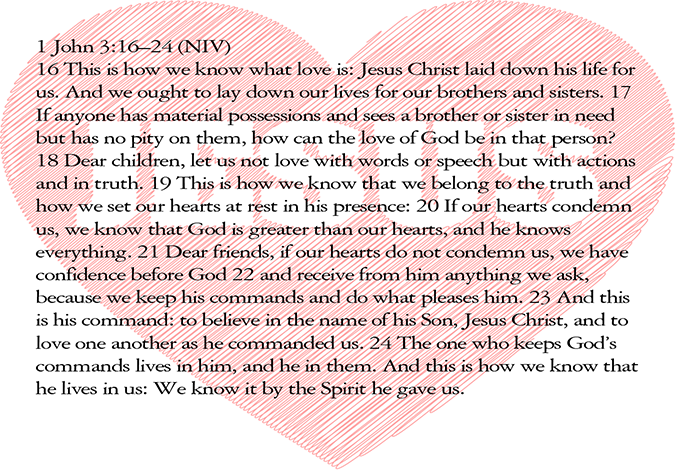1 John 3:16-24
 1 John 3:16-24 emphasizes the nature of true love, sacrifice, and the believer's confidence in God. It begins by defining real love as Jesus laying down His life for us, which sets an example that we should also be willing to sacrifice for others. The passage underscores the importance of not merely loving in words but showing love through actions and truth, which assures us that we are living in the truth and will set our hearts at ease.
1 John 3:16-24 emphasizes the nature of true love, sacrifice, and the believer's confidence in God. It begins by defining real love as Jesus laying down His life for us, which sets an example that we should also be willing to sacrifice for others. The passage underscores the importance of not merely loving in words but showing love through actions and truth, which assures us that we are living in the truth and will set our hearts at ease.
The text also discusses how our hearts may sometimes condemn us, but God is greater than our hearts and knows everything. This is reassuring, as it means that even when we doubt ourselves, God's understanding and presence transcend our self-judgment.
The latter verses focus on the confidence believers can have before God. This confidence is rooted in obeying God's commands—believing in the name of His Son, Jesus Christ, and loving one another. When we follow these commands, we live in union with God and His Son, and He with us. This relationship is confirmed and strengthened by the Spirit God has given us. Through this connection, we have the assurance that our prayers and petitions align with His will and are more likely to be answered.
Authorship
The First Epistle of John is widely attributed to John the Evangelist, traditionally identified as one of Jesus' original twelve apostles and also the author of the Gospel of John. This attribution is based on the style, language, and theological content that closely mirrors the Gospel of John. Scholars like Stephen S. Smalley support this traditional attribution due to the "internal evidence" presented in the text itself (Smalley 22).
Audience
The epistle addresses a community of early Christians, likely located around Ephesus, where John was active in his later years. This community was grappling with doctrinal disagreements, especially concerning the nature of Jesus Christ. John writes to affirm the core beliefs of Christianity against the rising influence of Gnostic ideologies, which posed a significant threat to the orthodox Christian views of the nature of Jesus (Brown 720).
Key Themes
1 John 3 emphasizes several critical themes:
- Love as an essential nature of God: This epistle underscores that God is love, and thus, his followers must demonstrate this through loving actions towards one another ("If we love one another, God abides in us and his love is perfected in us" (1 John 4:12)).
- Sin and righteousness: The text makes a clear distinction between the children of God and the children of the devil; those who do not practice righteousness and do not love their brothers are not of God (1 John 3:10).
- Christ's true identity: It counters early heresies denying Jesus' humanity and divinity, emphasizing that acknowledging Jesus as the Christ is crucial to genuine faith (Kostenberger and Kellum 141).
Historical Context
Written in the late 1st century AD, around 85-95 AD, 1 John aims to consolidate Christian doctrine within the internal strife and external pressures of Gnosticism. The community John addresses had been influenced by beliefs that saw the spiritual as wholly good and the material as evil, contradicting the Christian doctrine of Jesus as fully human and divine (Coogan).